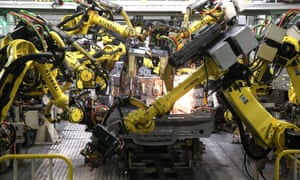We are invited to celebrate robots as a sign of progress, growth,
greatness. That’s why they are never mentioned by fiery politicians
seeking a scapegoat
We can well understand the worn patience of the one waiting in line, because in truth, for most middle- and lower-income Americans, the line has stalled or moved back. For the most part, though, the real line-cutters are not people one can blame or politicians can thunder against. That’s because they’re not people. They’re robots.
Nothing is changing the face of American industry faster than automation, and nowhere is that change more stark than in the cornerstone of Louisiana’s industrial wealth: oil.
According to a 2017 Bloomberg report, Nabors Industries, the world’s largest onshore driller, expects to cut the average number of workers at each oil well site from 20 to five. “To me, it’s not just about automating the rig, it’s about automating everything upstream of the rig,” said BP’s head of upstream technology.
Focusing on tasks and skills involved in 70 occupations, in 2013, Oxford University researchers made rough estimates of the “automatability” of each one. In oil the current vulnerability to automation is:
- Chemical engineers – less than 1%
- Petroleum engineers – 16%
- Chemical technicians – 57%
- Petroleum pump system operators – 71%
- Derrick operators – 80%
- Chemical plant and system operators – 85%
- Petroleum technicians – 91%
And this is only the beginning. According to a McKinsey study of 2,000 work activities across 800 occupations, “half of today’s work activities could be automated by 2055”.
"For millions of people, the line inching toward the American dream has gotten slower and longer."
To be sure, as old jobs go out, some new jobs appear. Still, automation as well as the squeeze big business mergers put on small business, as Robert Reich explains in Saving Capitalism, are very much at play. In manufacturing, studies show, the main cause of job loss is automation.
But job loss isn’t the whole story. If a male worker is displaced from a well-paid job as a factory technician, he may find a new job, but it may be in the service sector –working as a home health aide or stocking shelves. Robots aren’t simply displacing white men; they are bumping them down into lower-paid jobs that women and black people have traditionally done.
Robots are profitable to business, of course, since they increase productivity and profits that don’t need to be shared with workers. Andrew Puzder, former CEO of the fast-food restaurants Carl’s Jr and Hardee’s, and Donald Trump’s first choice for secretary of labor, explained in an interview with Business Insider that robots were “always polite, they always upsell, they never take a vacation, they never show up late, there’s never a slip-and-fall, or an age, sex or race discrimination case”.
And so for millions of people, the line inching toward the American dream has gotten slower and longer. If automation is the big, hidden line cutter, why is it missing from our understanding of middle- and working-class resentment and from the deep story into which that resentment crystallizes?
New dog-like robot from Boston Dynamics can open doors – video
But whatever our politics, this leaves us at an emotional dead end, for how can we get mad at wordless, raceless, genderless, homemade American robots cutting in line, one by one by one?
- Copyright © 2016 by Arlie Russell Hochschild. This excerpt originally appeared in Strangers in Their Own Land: Anger and Mourning on the American Right, published by The New Press Reprinted here with permission.

No comments:
Post a Comment